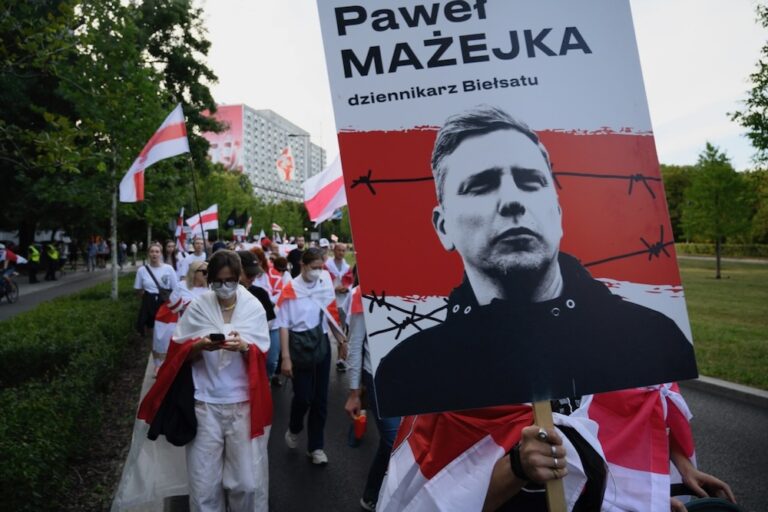Independent journalists Dzmitry Halko and Alyaksandr Yarashevich were arrested in Minsk on 6 May after covering the release of a group of jailed demonstrators.
Reporters Without Borders calls for the immediate and unconditional release of independent journalists Dzmitry Halko and Alyaksandr Yarashevich, who were arrested in Minsk on 6 May after covering the release of a group of jailed demonstrators.
“The illegal arrest of Halko and Yarashevich and the absurd charges on which they have been jailed are yet more evidence of the government’s determination to crush independent journalism, and are designed to intimidate all their colleagues,” Reporters Without Borders said.
“The trials at which they were given jail terms were a complete violation of their right to due process. They should be freed at once.”
Halko, a freelancer and former employee of the independent newspaper Narodnaya Volya, and Yarashevich, a correspondent for Radio Racyja, an independent station based in the Polish city of Białystok, were arrested close to a Minsk subway station on the evening of 6 May, after covering the release of demonstrators held since an anti-nuclear march that environmentalists and anti-government activists organize every 26 April.
Without being given any explanation, Halko and Yarashevich were bundled into a police minibus and, after spending the night in police custody, they were tried the next day before the Maskouski district court in Minsk, which sentenced them to 10 and 12 days in prison, respectively, on charges of “resisting the police” and “hooliganism.”
According to the Belarus Association of Journalists (BAJ), which attended their trials, the only witnesses to give evidence were the arresting police officers, whose statements were vague and contradictory. No recording, not even an audio recording, was allowed during the trial.
This was Yarashevich’s second arrest in 10 days. He and fellow Radio Racyja reporter Henadz Barbarych were sentenced to three days in prison after covering the 26 April demonstration. Just hours before being re-arrested, Yarashevich filed an appeal against his first conviction before the Minsk district court.
“Yarashevich was arrested because he is a Radio Racyja reporter who had gone to meet opposition activists [as they left prison] and because the authorities don’t like him,” Barbarych told Reporters Without Borders. The station’s correspondents are often refused accreditation.
In a separate development, Aleh Hruzdzilovich, a reporter for Radio Free Europe/Radio Liberty’s Belarusian service, was interrogated by the Minsk prosecutor’s office on 8 May about his coverage of the government’s response to the April 2011 Minsk subway bombing.
At the end of the interrogation, he was warned to stop disseminating “biased and deliberately distorted reports” and stop “discrediting” the country’s judicial system.
Hruzdzilovich produced several reports about the bombing for the second anniversary and he authored a book by him entitled “Who Blew Up the Minsk Metro?” His book and reports cast doubt on the credibility of the Belarusian investigation into the bombing and the judicial system’s impartiality.
The subject is very sensitive and several other journalists have been arrested or questioned for covering it.
Belarus is ranked 157th out of 179 countries in the Reporters Without Borders press freedom index.


